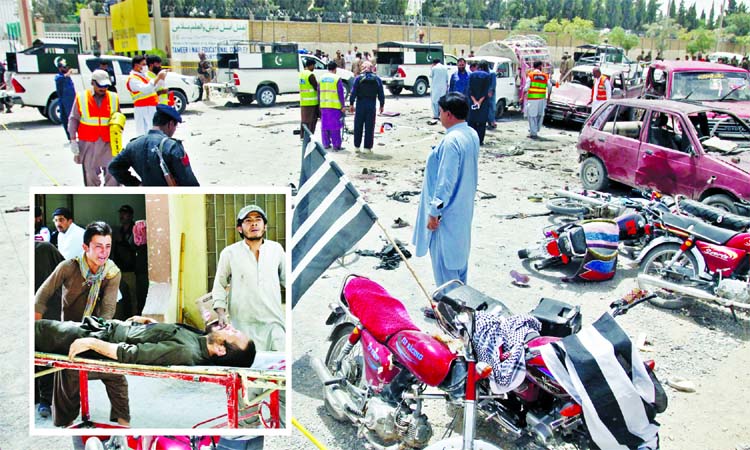
Violence has erupted as millions head to the polls in Pakistan, with at least 31 dead in the worst attack, a bomb in the city of Quetta.
Elsewhere, minor blasts and clashes between party workers left several injured and two dead.
Opinion polls suggest the election battle will be between the parties of ex-cricket star Imran Khan and the disgraced former PM Nawaz Sharif.
But the campaign has been overshadowed by concerns of fraud and violence.
The Human Rights Commission of Pakistan says there have been “blatant” attempts to manipulate the polls.
Mr Khan has vowed to tackle corruption but his rivals accuse him of benefiting from alleged meddling by the military, which has ruled Pakistan for nearly half of its history.
Mr Sharif, who won the last election, has been jailed for corruption after a scandal stemming from the Panama Papers leak.
Polling is due to end at 18:00 (13:00 GMT), with results probably known early on Thursday.
Despite tight security, with hundreds of thousands of troops and police officers deployed across the country, there have been incidents.
Officials say the attack in Quetta, in Balochistan province, was the work of a suicide bomber targeting police at the gate of a polling station.
The Islamic State (IS) group said it was behind the attack.
An IS-claimed attack targeting a political rally earlier this month in nearby Mastung killed at least 149 people.
On Wednesday, there were reports of a death in a grenade attack in Khuzdar, also in Balochistan, and another in a shooting between political rivals in Swabi, Khyber Pakhtunkhwa province.
The Dawn newspaper also reported clashes in Mardan, Rajanpur, Khipro and Kohistan.
Pakistan has been ruled on and off by the military during its 71-year history. This election is significant because it will mark only the second time that one civilian government has handed power to another after serving a full term.
But the run-up to the vote has been controversial.
Mr Sharif’s Pakistan Muslim League-Nawaz (PML-N) complains of a targeted crackdown by the security establishment, with the alleged help of the courts, in favour of Imran Khan and his Pakistan Tehreek-e-Insaf (PTI).
On Sunday, a judge in the High Court of Islamabad appeared to support that allegation, saying that the military Inter-Services Intelligence (ISI) organisation had been interfering in the judiciary.
In a BBC interview on Monday, Mr Sharif’s daughter Maryam Nawaz — who was jailed earlier this month with her father on related charges – criticised the military.
“When a prime minister refuses to put down his head and do their [the military’s] bidding, they pull him down with four things; get a religious fatwa issued against him, call him a traitor, call him a friend of India, or call him corrupt. They use these things against every elected prime minister,” she said.
Several PML-N candidates also say they have been coerced to switch to the PTI. The Pakistani military denies interfering in politics.
Independent media, meanwhile, say there have been blatant attempts to muzzle them. There are also concerns about the participation of internationally designated militants in the election process.
For all these reasons, the human rights commission has said there are “ample grounds” to question the legitimacy of the polls, “with alarming implications for Pakistan’s transition to an effective democracy”.
As voters queue up outside polling stations, the question on everyone’s mind is whether Mr Khan will be the next prime minister.
He entered politics in the late 1990s when memories of Pakistan’s cricketers winning the World Cup were still fresh. But only in 2013 did his party emerge as a serious contender, with its leader touted as a harbinger of change out to fight corruption.
The election is generally seen as a contest between the PML-N, now led by Mr Sharif’s brother, Shehbaz, and the PTI.
Nawaz Sharif – a 68-year-old three-time PM – made a dramatic return to Pakistan ahead of the vote to face a 10-year prison sentence. He was disqualified from office last year by the Supreme Court after the Panama Papers leak revealed his family’s ownership of several luxury flats in London.
His appeal hearing will not be held until after the vote.
As he cast his vote in the Islamabad suburb of Bani Gala, Mr Khan, 65, told reporters it was “time to defeat parties which kept this country hostage for years”.
The country’s best-known opposition politician has denied colluding with the military. Analysts say he will have to make serious inroads in Punjab province – a PML-N stronghold – in order to win the vote.
The party of assassinated former prime minister Benazir Bhutto, the historically liberal PPP, is widely expected to come third.
It is now fronted by Ms Bhutto’s son, Bilawal Bhutto Zardari, a 29-year-old Oxford University graduate.

